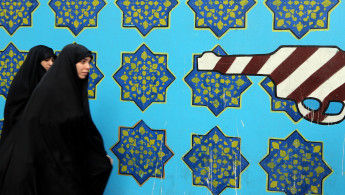Two Iranian women fined for 'incorrect' hijab
A Tehran court has fined two women $260 for violating the Islamic dress code by not wearing their mandatory hijabs [headscarves] properly in the street, a judicial official was quoted Wednesday as saying.
"In recent days several cases have been filed in the court for bad hijabs and, in two of them, the accused were sentenced to pay nine million rials ($260/232 euros) in cash," reformist daily Arman quoted the official as saying.
When in public, all women in Iran, even foreigners, are required to wear the loose scarf, which covers the hair and neck.
| When in public, all women in Iran, even foreigners, are required to wear the loose scarf, which covers the hair and neck |
But since the mid-1990s, there has been a gradual relaxation of the dress code despite continued campaigns by police to enforce it.
In some rich neighbourhoods of northern Tehran, a city of 12 million, it is not uncommon to see women's scarves around their shoulders.
Many young women also wear tight clothes and short coats.
No details were given on what the women had done wrong to warrant the fine, which is equivalent to the monthly minimum wage.
Since his election in 2013, moderate President Hassan Rouhani has overseen some political and social reforms, but much Iran's political establishment remains deeply conservative.
Earlier this month, a police official said women drivers could have their cars impounded if they are caught driving with a poorly fixed veil or with their heads uncovered.
"If a [female] driver in a car is poorly veiled or has taken her veil off, the vehicle will be seized in accordance with the law," said Tehran traffic police chief General Teymour Hosseini.
In addition to the struggle to make women, and men, observe Islamic values in the public, police also interfere in people's private lives.
In the past six months, managers of 73 residential buildings have been "called in" as part of the war against mixed "night parties," Arman quoted the same official as saying.
"The number of night parties has dropped sharply compared to last year," he said.
Parties involving unmarried men and women are prohibited by law.
Women's rights
The rights of women in the Islamic Republic has been in the spotlight for years.
Most recently, news about the captain of the Iranian women's football team missing the Asian Cup tournament after her husband confiscated her passport in a domestic quarrel, resurrected the debate.
The dispute between 30-year-old midfielder Niloufar Ardalan and her husband, sports journalist Mahdi Toutounchi, sparked social media chatter across Iran, with many demanding she be allowed to travel and play.
Under Iranian law, husbands can stop their wives from travelling outside of the country.
American goalkeeper and a two-time Olympic gold medalist, Hope Solo responded to the news by saying that "Everyone should be able to represent their nation."
|
However, in an Instagram post Tuesday, Ardalan said foreign media was exaggerating her case, but also acknowledged she would be missing the tournament.
She also made a call for Iran to change its laws governing married women's travel.
"I am only a national soldier who fights to raise flag of our country," Ardalan, known by the nickname "Lady Goal," wrote.
"I wish a law would be approved that allows female soldiers to fight for raising the flag."
Women's sports largely disappeared after Iran's 1979 Islamic Revolution. Over time, however, they have gained popularity, especially football.
Social customs still come into the game though, as the country's soccer team plays its games with players' hair covered by hijabs.
Two Islamic countries make the headscarf mandatory for women in public — Iran and Saudi Arabia. FIFA overturned a yearlong ban against players wearing hijabs in 2012.





 Follow the Middle East's top stories in English at The New Arab on Google News
Follow the Middle East's top stories in English at The New Arab on Google News
![The UAE is widely suspected of arming the RSF militia [Getty]](/sites/default/files/styles/image_330x185/public/2024-11/GettyImages-472529908.jpg?h=69f2b9d0&itok=Yauw3YTG)
![Netanyahu furiously denounced the ICC [Getty]](/sites/default/files/styles/image_330x185/public/2024-11/GettyImages-2169352575.jpg?h=199d8c1f&itok=-vRiruf5)
![Both Hamas and the Palestinian Authority welcomed the ICC arrest warrants [Getty]](/sites/default/files/styles/image_330x185/public/2024-11/GettyImages-2178351173.jpg?h=199d8c1f&itok=TV858iVg)